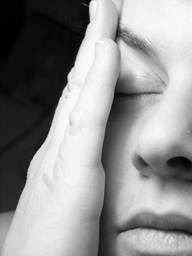Introduction
 Post concussion syndrome refers to a group of symptoms that arise after a head injury. The same sort of symptoms can arise after a leakage of blood into the head (brain haemorrhage). They are quite common, often very troubling, though thankfully they go away with time.
Post concussion syndrome refers to a group of symptoms that arise after a head injury. The same sort of symptoms can arise after a leakage of blood into the head (brain haemorrhage). They are quite common, often very troubling, though thankfully they go away with time.
What are the Symptoms?
- Headaches – These are usually generalised headaches though may be more pronounced in one area or one side of the head than the other. They will tend to be worse towards the end of the day, though may be present at any time.
- Poor Concentration – This is worse when there is surrounding noise or activity. Even simple things such as watching a long movie or reading a simple newspaper can prove difficult. As a result, you can often lose the plot of a story or fail to follow a conversation.
- Poor Memory – This is usually for recent events and can affect things such as remembering to keep appointments or getting to the shops and forgetting what it was you had set out to buy. Early or long term memories tend to be preserved.
- Sleep Disturbance – Often sufferers continually feel tired though are unable to get a good night’s sleep. They will tend to sleep fitfully for a few hours at a time and wake up feeling exhausted. Some may find that they sleep in the day and are awake all night.
To read more about the symptoms of post concussion syndrome, please press here.
What Things Make it Worse?
The symptoms can tend to be exacerbated by a number of things though most potently tiredness, hunger, thirst, social pressures and particularly physical exercise and work be that physical or mental.
What Measures Help?
The following are a number of areas which when tackled together may ease the symptoms while the condition persists.
A. Regulate Sleep
It is important that you try to get back into the cycle of sleeping at night and not lying in too long in the morning. Setting a period of 8 hours sleep and trying to control this with an alarm clock is sensible. It may be that you will require a fixed period of sleep in the afternoon though again sticking to a regular pattern is the key.
B. Regular Meals
The brain is particularly sensitive to fluctuations in the level of sugar in the blood. It is, therefore, very important to eat regular meals 3-4 times a day in order to maintain the level of sugar in the blood at a relatively constant level. You should certainly avoid missing meals and in particular getting up so late that you do not have breakfast. Grazing is a useful concept i.e., take your elevens’s with a biscuit and likewise afternoon tea and a bedtime drink.
C. Good Hydration
It is important that you maintain the hydration of the brain as it is also very sensitive to fluctuations in this. The simplest way of monitoring your hydration is to look at the colour of the urine. If it is relatively clear, you are doing well. If it is yellow, you should be drinking more.
D. Diet
There are certain foods such as cheese and chocolate which are often thought to provoke headache, particularly with migraine sufferers. You may wish to explore excluding these from your diet though there is little hard evidence to suggest it helps patients suffering from this syndrome.
A normal diet is perfectly acceptable. However, certain things should be avoided. Caffeine containing drinks (tea, coffee, lucozade, coca-cola and some fitness drinks) should be taken only in moderation, i.e 2-3 cups a day at a maximum. Similarly, alcohol should be avoided where possible. If these drinks are taken, extra measures to maintain your hydration should be pursued i.e. you should drink more water.
Can Medications Help?
For most patients, the measures above are all that is required. For some, medications are of assistance. For the sleep disturbance, medications such as Amitriptyline may be of help when taken at night. This is an antidepressant drug though in this instance is used to regulate sleep. You will need a prescription from your doctor.
For headache, it is best to take a simple analgesic such as Aspirin or Paracetamol. Stronger medications simply do not seem to work and may indeed make the headaches worse.
What Will Happen?
Thankfully for the vast majority of patients these symptoms settle. It may, however, take several months.
Return to Work
You should not return to office work until your symptoms have settled. If you go back too early you will make the symptoms worse and delay their resolution. You should go back to work gradually. Your brain is a muscle and running a marathon after being off running for a while leads to injury. Some researchers looked at concussion and mental performance and showed that even a mild concussion led to a mental deterioration equivalent to being drunk. If your employer would be happy to see you at work intoxicated go back early! Seriously, you will be doing no one a favour if you go back too early.
Return to Sport
Again you need to symptom free before you start to exercise. By exercise we do not mean contact sport. Before you go back to that you need to have passed certain tests and stages. This is a specialist field and the advice is tailored to each individual. We are very happy to do this for you. N.B. going back to collision sports like rugby and football before you are fully recovered can be very dangerous. Knowing when you have recovered can be very difficult. PLEASE seak professional advice either from us or other qualified specialists